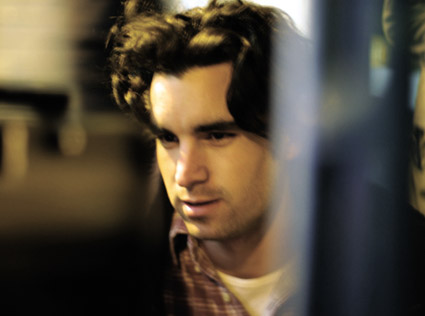Victim: The poetry of fear
Pip Christmass

Corrie Jones
Flickering between past and present in a visual and narrative rendering of childhood memories of pain, fear and resilience, Victim is the audacious directorial debut of Perth-based filmmaker Corrie Jones. The film takes its viewer inside the mind of Sera, a kidnap victim who wakes up bound, gagged and trapped inside the boot of a car. Through a voiceover, Sera recalls situations in which she felt afraid as a child (a bike accident, a visit to hospital), compulsively reminding herself that she has survived these relatively minor traumas.
The film’s frequent childhood flashbacks are dreamy and visually beautiful, suffused with a light deliberately contrasted with the dark, grainy images of Sera’s terrifying present. The film opens with images of the young Sera chasing butterflies through a field, as the camera lingers on a book whose blank pages are ruffled by the wind. The symbolism of these early images—butterflies as symbols of flight and freedom, a blank book as a story yet to be told—becomes evident once the voiceover intrudes and reveals a much darker tale. A close-up of young Sera’s innocent face transforms into a shot of a darkening sky, and suddenly the viewer is confronted by a fear-stricken, panicking face, mouth taped, terror in the eyes.
This balance between dark and light, terror and resilience, claustrophobia and open space is beautifully crafted and delicately maintained throughout, as the film moves between images of the adult Sera’s struggle against her kidnapper, her childhood experiences and her memories of loved ones she fears she might never see again. Victim’s mood of psychological intensity is quite extraordinary given its brief 10 minute duration. Tight editing, unusual camera angles by cinematographer Torstein Dyrting and an eerie score by Alex Ringis further contribute to Victim’s escalating sense of tension. The voiceover by New York poet Nicole Blackman is eerily hypnotic and calm, a whispered soundtrack to an unimaginable ordeal.
Corrie Jones discovered Nicole Blackman’s work during his time as a film student at Curtin University (he graduated in 2001). A friend working at the independent music store, 78 Records, recommended he listen to Blackman’s spoken-word recordings after noticing the sort of music he was buying. Victim was the first track on the album: “The first time I listened to it, I was totally captivated, in awe of it”, says Jones. “I kept playing it over and over. But the idea to actually do Victim as a film didn’t come until a couple of years later.”
Jones contacted Blackman via her website and proposed translating the poem into a short film. Blackman’s initial response was tentative; according to Jones, she felt deeply protective of the piece, but was convinced by his script treatment and the strength of his emotional response to the narrative.
With limited student work to show potential financers, Jones had to rely on extensive storyboarding and director’s notes to persuade investors he had the ability to make the film. Amy Lou Taylor, a producer with a commercial background, was brought on board and a $120,000 budget was secured from ScreenWest and the Australian Film Commission. Victim was filmed and produced in Perth by a group of relative newcomers, but its local impact was immediate. The first screenings in Perth were controversial, where it was shown with Siddiq Barma’s Osama as part of the 2003 Perth International Arts Festival. With the serial killings of 3 young women in Perth’s northern suburbs still haunting the newspaper headlines, Victim hit a raw nerve. Although the film shows a bound and gagged woman at the mercy of an armed kidnapper, many viewers interpreted the film as being about a woman’s rape, which is not even indirectly implied.
Jones views the film’s real subject as self-empowerment rather than victimisation. His protagonist struggles to the end, and when she realises she may die, she attempts to live the last moments of her life with psychological strength and resolve, rather than annihilating terror. “I wanted to show an inner strength through the detachment of the narration”, Jones explains. “The film is about a woman confronting her fears, dealing with them as they hit her.”
Victim has already won a number of prestigious Australian awards, including an Early Career Award at the 2003 WA Screen Awards, the SBS Eat Carpet award, and Best New Director award at the 2004 St Kilda Film Festival. Jones is now in the embryonic stages of developing a script for a feature film. He admits making the transition from a critically acclaimed 10 minute short to a feature is a little daunting. With influences ranging from the European avant-garde to Wong Kar-Wai, Jones envisages a more autobiographical story that explores the impact of memory and moments of personal significance. He claims to be uninterested in making mainstream films, and suggests he is naturally drawn to darker themes and issues: “In Victim I was trying to push the envelope”, he says. “I wanted to go to places that were a bit darker, a bit more risky.”
Victim, director Corrie Jones; producer Amy Lou Taylor; writers Corrie Jones, Nicole Blackman; performers Rebecca Davis, Jade Richards
RealTime issue #65 Feb-March 2005 pg. 22






